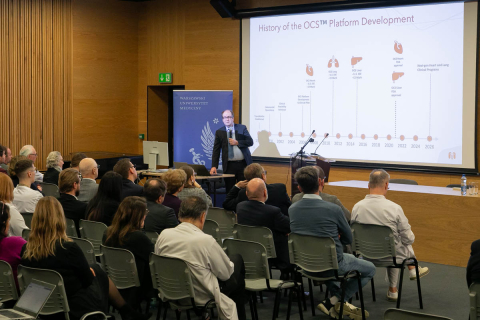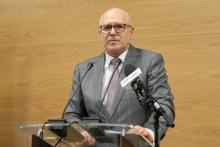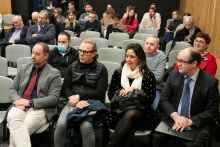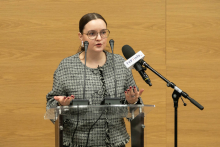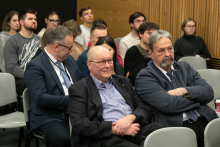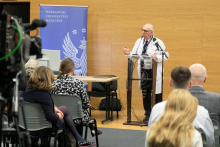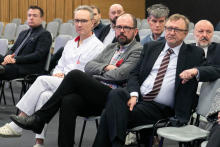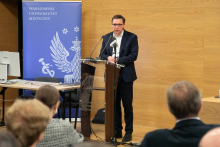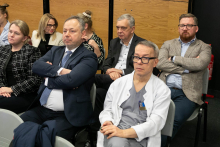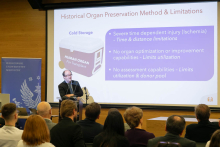The meeting was organized by Prof. Mariusz Kuśmierczyk and Dr. Zygmunt Kaliciński from the Department of Heart, Thoracic and Transplant Surgery UCC MUW, thanks to whom the OCS Heart system came to our clinic (more information about it here). The speakers were international experts from the US and Europe who use the OCS system. The audience included transplantologists from various centers, as well as doctors from the University Clinical Center MUW. The MUW authorities and the representative from the Ministry of Health were also present.
- As Rector, I am immensely proud and pleased that transplantation is developing so wonderfully at our university and in our clinical hospitals. I can see how the number of procedures and the level of sophistication are increasing, all this to give our patients the best possible chance of survival - said Prof. Rafal Krenke, opening the meeting.
Ministry funds lung and liver perfusion, but what about the heart
Magdalena Kramska, Head of the Department of Transplantation and Hematology in the Investment Assessment Department at the Ministry of Health, thanked for the invitation to participate in the meeting, emphasizing:
- As part of the tasks of the Ministry of Health, the National Transplantation Program is being implemented, this is the next edition. Previously, we talked about development, now we also focus on development, but in a slightly different dimension, hence we are particularly interested in learning about innovations that make your work easier, that allow us to increase the pool of available organs for transplantation, but also that guarantee recipients - patients a faster, safer recovery.
The ministry supports extracorporeal lung and liver perfusion.
- We are extremely interested, in the context of the implementation of the program this year and in the years to come, to learn the details of cardiac perfusion and, from the ministry's side, to support in these innovations as well - Magdalena Kramska said.
What are the benefits of perfusion methods in transplantation
Prof. Michał Grąt, Vice Rector for International Relations, Development and Promotion, Head of the Department of General, Transplantation and Liver Surgery UCC MUW, and National Consultant in Clinical Transplantation, thanked the Ministry for its support of methods to improve the quality of organ transplantation in Poland. Because, as Prof. Michał Grąt stressed, there is currently no doubt that perfusion methods yield much better results than static methods. And perfusion in normothermia, the method on the basis of which OCS works, is a revolution in transplantology of the 21st century.
- Never before have we been able to assess in real time whether an organ - a liver taken from a deceased donor - will function. This is obviously not a certainty with extracorporeal perfusion in normothermia, but we have a very high risk reduction - said Prof. Grąt.
He also noted the logistical and organizational advantages of using this perfusion method in large transplant centers.
- In addition to all the advantages regarding the quality of the organ, risk reduction, improved safety, we can, in some cases, especially difficult transplants, turn an urgent operation in difficult overnight conditions into a scheduled operation, where the team can be prepared for difficult medical challenges. Perfusion methods make it possible to extend the time from retrieval to implantation by even more than 24 hours, which really gives a lot of time for preparation, and thus increases patient safety - Professor Michał Grąt concluded.
OCS systems in clinical practice - sharing experiences
During the conference, about their experiences with OCS systems spoke: Malcom MacConmara, Vice President of Abdominal Medical Affairs at TransMedics, Inc. for liver transplants, and Marco Schiavon of the University of Padova, for lung transplants. Dr. Zygmunt Kalicinski and Dr. Bartłomiej Zych from the Department of Cardio-Thoracic Transplantation & Mechanical Circulatory Support at Harefield Hospital in London, talked about what the system provides in heart transplants. The experts unanimously stressed that the use of the system is a response to the organ shortage, allows for an increase in the number of transplants performed, improved treatment outcomes, better coordination of transplant procedures and reduced costs of patient care.
It was also possible to talk to Mr. Jerzy, the first patient of the department to be implanted with a heart kept “alive” by the OCS Heart system, and a 14-year-old patient who received a new heart on January 6 of this year. The heart for the patient was retrieved in Lithuania and transported by ambulance to Warsaw. The transport took more than seven hours.
- The motivation for the introduction of this device was a group of patients, including those with congenital heart defects after multiple surgeries, for whom transplantation is the only way to salvation, to prolong their lives - said Dr. Zygmunt Kaliciński from the Department of Heart, Thoracic and Transplant Surgery UCC MUW, founder of the Foundation for Transplantation ‘Leave Your Heart on Earth,’ thanks to which it was possible to purchase OCS Heart for UCC MUW.
Dr. Kaliciński stressed that the OCS system helps in difficult cases: when the heart is far away, when the donor is suboptimal, but also when the heart comes from a donor who has been diagnosed with death due to irreversible cardiac arrest (DCD). Such donors, according to Dr. Kaliciński, are plentiful, both in the States and in Europe.
- Let's get out of the ice age together, especially as far as the heart is concerned, and let’s fly on a space odyssey, to the future - said Dr. Zygmunt Kalicinski.
The meeting was attended (in addition to those mentioned above) by, among others,: Dr. Michał Buczyński from the Department of Heart, Chest and Transplant Surgery UCC MUW, Director of Treatment at the Żwirki i Wigury location UCC MUW, Wojciech Figiel, MD, PhD, Deputy Director of Treatment at the Banacha location UCC MUW, Prof. Bartosz Kubisa from the Department of Heart, Chest and Transplant Surgery, Prof. Bożena Werner, Head of the Department of Pediatric Cardiology and General Pediatrics UCC MUW, Prof. Artur Kamiński, Head of the Department of Transplantology and Central Tissue Bank MUW, Director of the Poltransplant, Prof. Jarosław Czerwiński, Head of the Department of Emergency Medicine MUW and Deputy Director of Poltransplant for medical affairs, Krzysztof Zając, Transplant Coordinator at the UCC MUW, as well as Prof. Piotr Przybyłowski, Director of the Silesian Center for Heart Diseases in Zabrze, Prof. Michał Zakliczyński, Head of the Department of Heart Transplantation and Mechanical Circulatory Support of the Department of Cardiac Surgery and Transplantation of the Heart Institute, and Prof. Janina Stępińska, Director of the National Institute of Cardiology.
